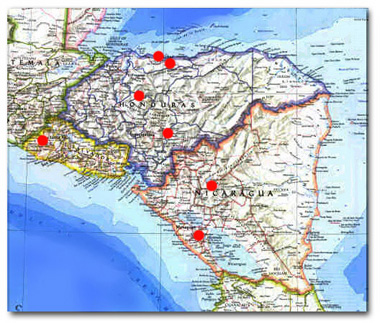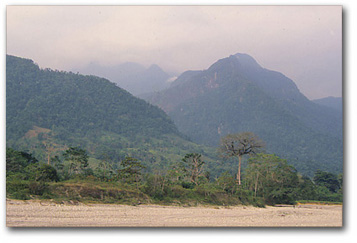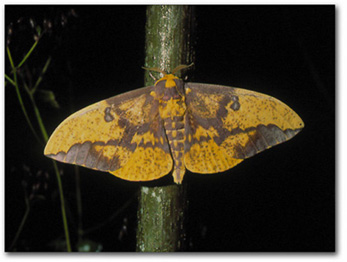|
COLLECTING
TRIP TO
HONDURAS, NICARAGUA, AND EL SALVADOR
May, 2000
|
| |
Our
second trip to Central America for this Biotic Surveys and Inventory
project (NSF/DEB 9870202) took place from 3-21 May. Brett Ratcliffe
(co-PI) and graduate students Federico Ocampo and Andrew Smith
collaborated with Ron Cave (co-PI in Honduras) and Roberto Cordero
and Julio Torres (Field Assistants) to curate collections, gather
data, and identify material at the Escuela Agrícola Panamericana
in Zamorano (Honduras), the Museo de Historia Natural in San
Salvador (El Salvador), and the Museo Entomológico in
León (Nicaragua) as well as to collect in all three countries.
Possibly the best collecting of the trip was at Parque Nacional
Pico Pijol in Honduras where we set up the light traps on a
soccer field totally surrounded by rain forest. Most of the
heavy rain that night went into our tents.
Eunice Echeverria, Director of the natural history museum in
El Salvador, organized a collecting trip to Parque Nacional
El Imposible near the Guatemalan border. We set the lights up
on a soccer field, and most of the rain that first night also
went into our tents . . . until they blew away. A pattern had
been established.
Collecting in Nicaragua was at Selva Negra in cloud forest near
Matagalpa and at Volcán Mombacho south of Managua. Afraid
of the pattern, wooden walls surrounded us at these places.
All photos were taken by Federico Ocampo except where noted. |
| |
| |
The
study area: Honduras, Nicaragua, and El Salvador. |
| |
| |
|
|
|
|
Field crew at EAP, Zamorano. Top row (L-R), Roberto Cordero,
Julio Torres, Andrew Smith, Brett Ratcliffe. Bottom row (L-R),
Ron Cave, Federico Ocampo. |
...... |
Collecting
site at Parque Nacional Pico Bonito, Honduras, on the Atlantic
coast near La Ceiba.
.
. |
| |
| |
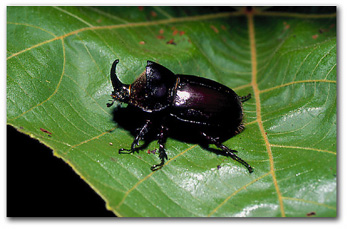 |
|
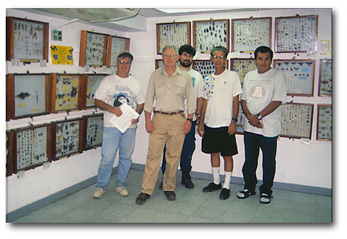 |
Buenas
noches, señor! An unlikely greeting from Heterogomphus
chevrolati Burmeister.
.
. |
...... |
Data
was gathered from numerous specimens from the Lehman Insect
Museum in La Ceiba. L-R, Ron Cave, Brett Ratcliffe, Andrew Smith,
Robert Lehman, and Roberto Cordero. |
| |
| |
 |
|
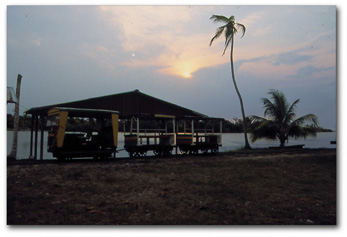 |
The
only overland access to the Refugio de Vida Silvestre Cuero
y Salado was by this ancient, narrow-gauge "railroad"
formerly used to haul coconuts and plantation workers. Dengue
and malaria are prevalent here. Prior to our trip, we never
dreamed we would be taking a train to a collecting site in
Central America! |
...... |
Hand-pushing
an empty flat car back down the tracks from the biological
station for a couple of kilometers worked well for getting
the light traps and gear to a good collecting spot. Clickety
clackiting along in pitch blackness with no lights at 25 km/h
was a bit of a rush . . . but then, there was no on-coming
trains to worry about. |
| |
| |
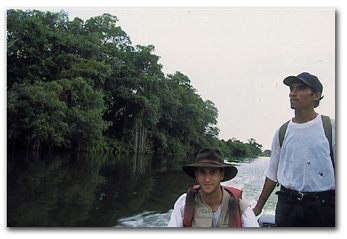 |
|
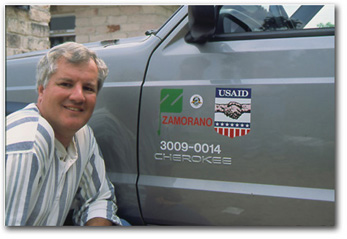 |
Federico
off to set dung traps in the surrounding forest of Cuero y
Salado.
. |
...... |
Ron
Cave proudly displaying the Team Scarab decal on his field
vehicle. We shall have to get a bigger one for "official"
field vehicles. |
| |
| |
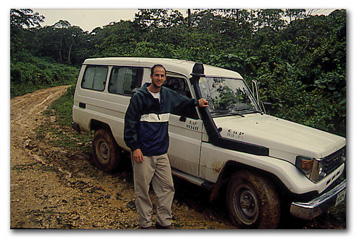 |
|
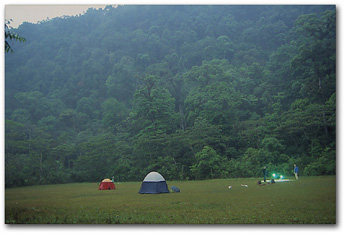 |
| The
final resting place of the "la ambulancia" when
it no longer had traction for the steep, slippery slope up
to Pico Pijol National Park, Honduras. The loss of one of
our vehicles resulted in a forced march with gear and pack
mules after dark. Photo by B. Ratcliffe.
. |
|
A
prime collecting site at 1,450 m on a soccer field at Parque
Nacional Pico Pijol. Collecting was excellent here, but the
tents leaked BADLY and we were forced to swim out of our sodden
sleeping bags before dawn. Kinda like adult dragonflies emerging
from their nymphal cases underwater. |
| |
|
|
| |
|
|
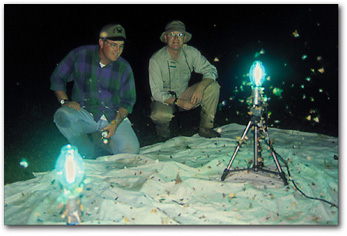 |
|
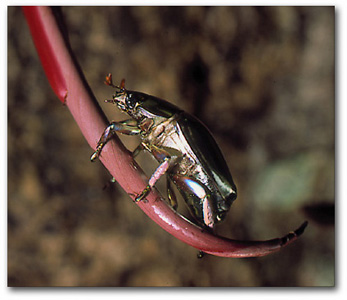 |
| Brett
Ratcliffe and Ron Cave approaching nirvana at Pico Pijol, Honduras. |
|
Plusiotis
strasseni Ohaus at Pico Pijol. All that glitters is not gold. |
| |
| |
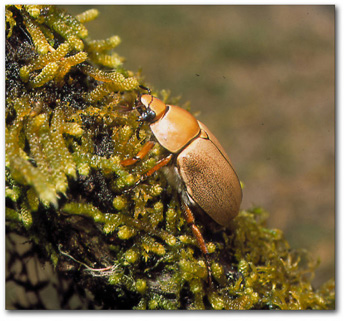 |
|
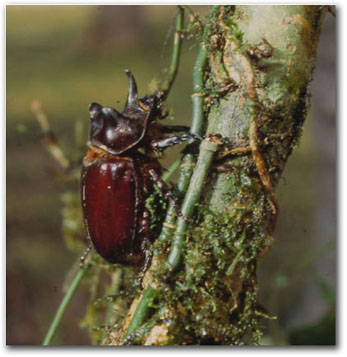 |
| Mesosternus
halffteri Morón occurs from Mexico to Honduras.
The specimen was collected at Parque Nacional Pico Pijol. |
|
Male
of Strategus aloeus (L.) at Parque Nacional Pico Pijol.
. |
| |
| |
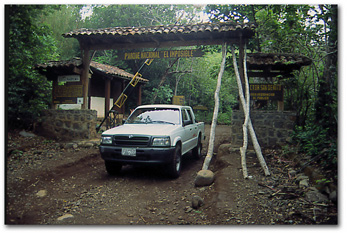 |
|
 |
Entrance
to Parque Nacional El Imposible, El Salvador.
. |
|
Andrew
Smith with one night's catch from El Imposible, El Salvador.
Preparation of the specimens occurs when we return to the lab. |
| |
| |
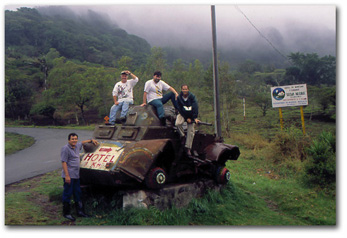 |
|
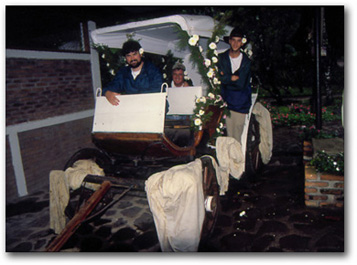 |
| Team
Scarab is hard on its field vehicles, especially those larger
ones needed for dynastines. Entrance to Hotel de Montaña
Selva Negra near Matagalpa, Nicaragua where there was excellent
cloud forests at 1,300 meters. L-R, Roberto Cordero, Ronald
Cave, Andrew Smith, and Federico Ocampo. Photo by "La Ambulancia." |
|
The
"wedding carriage" at the Hotel de Montaña
doubling as a drying platform for the light trap sheets. As
for Andrew, Ron, and Federcio, well . . . . they have probably
been in the field too long. Photo by Roberto Cordero.
.
. |
| |
| |
| |
| A
large saturniid moth, Eacles imperialis decoris, at Selva Negra. |
| |


